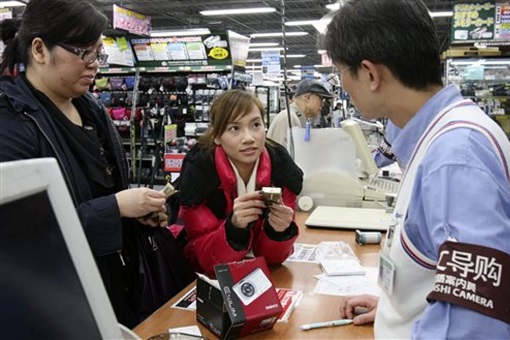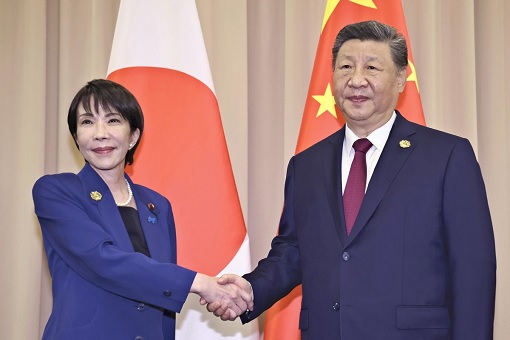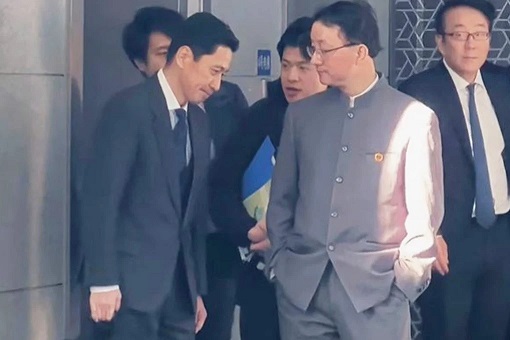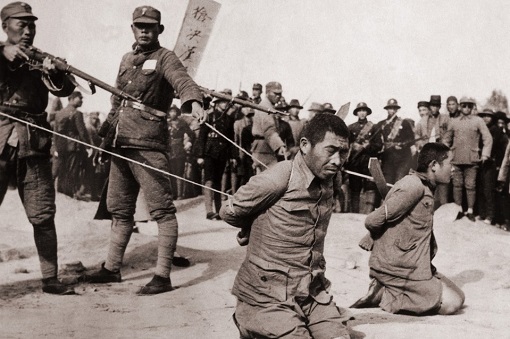
How Takaichi’s Big Mouth Allows China To Make Strategic Moves
November 26th, 2025 by financetwitter
Sanae Takaichi, Japan’s first female prime minister, has pledged to make the country “strong and prosperous” again. Her role model was Margaret Thatcher, Britain’s first female prime minister and “Iron Lady.” Her political mentor in Japan was Abe Shinzō, who was assassinated in 2022. During her run for her party’s leadership, Takaichi focused mainly on Japan’s economy and its defense.
However, despite her success – third attempt at the LDP presidency – to the growing popularity of conservative nationalism in Japan, she may have bitten off more than she can chew with her aggressive brand of conservative politics. She appears to have poked the red dragon the wrong way as China is escalating a hostility she provoked on November 7.
Beijing reacted angrily after the Japanese new premier said an attack on Taiwan could trigger the deployment of her country’s self-defence forces. While Japan’s post-war constitution forbids it from using force as a means of settling international disputes, a 2015 law – passed during Abe administration – permits it to exercise self-defence in certain situations, even if it is not directly under attack.

In retaliation, the Chinese consul general in Osaka, Xue Jian, said in a post on X – “We have no choice but cut off that dirty neck that has been lunged at us without hesitation. Are you ready?” Whatever vows to build “constructive and stable” relations between both countries after Takaichi’s meeting with Chinese leader Xi Jinping at the APEC summit in South Korea has vaporised.
Takaichi, with hawkish views on China, may not realize (or pretends to be ignorant) that his mentor’s 2015 law was drafted to most likely involve Japanese support for US-led military action in the region. Will Japan under her administration unilaterally go to war with China if the Chinese suddenly invade Taiwan, even if the U.S. somehow decides not to participate?
Insisting that Japan could exercise its right to collective self-defence – or coming to the aid of an ally – Takaichi said Tokyo had to “anticipate a worst-case scenario” in the Taiwan Strait. But if China attacks only Taiwan without firing a single shot at Japan, then Tokyo cannot claim self-defence if it starts attacking China under the pretext of defending Taiwan. That would be a declaration of war on China.

Thanks to her big mouth, Beijing has told Chinese tourists to boycott Japan. Many tourism and retail businesses in Japan rely heavily on Chinese visitors, who spend more on average than other foreign tourists on everything from sushi to skincare. Some hotels, designer clothes shops and even pharmacies have Mandarin-speaking assistants, while department stores often have signs in Chinese.
China is the biggest source of tourists to the archipelago, with almost 7.5 million visitors in the first nine months of 2025 – a quarter of all foreign tourists, according to official Japanese figures. Last year, each Chinese tourist spent on average 22% more than other visitors. Attracted by a weak yen, they splashed out the equivalent of US$3.7 billion in the third quarter alone.
Tokyo tried to downplay the impact on its tourism, even though it could lose as much as US$1.2 billion in visitor spending between now and the end of 2025. Most Chinese airlines, as well as Cathay Pacific Airways, are waiving cancellation fees on tickets to Japan, accelerating cancellations. If mainland Chinese visitors continue to stay away through 2026, the cumulative hit could reach as much as US$9 billion.

A day after China issued a travel ban for Japan, the Takaichi cabinet quickly dispatched a senior foreign ministry official to Beijing in an attempt to ease tensions, but the trip yielded no results. That alone was sufficient to suggest that the economic impact on Japan’s tourism sector is serious as retail and tourism stocks subsequently plunged after about 500,000 people have cancelled flights.
Another hammer hitting the Japanese economy was China’s ban on all Japanese seafood imports, just months after it partly lifted a previous ban issued in 2023 as a result of Japan’s decision to release wastewater from the damaged and decommissioned Fukushima nuclear plant. Before the 2023 ban, the Chinese market – including Hong Kong – accounted for more than one-fifth of Japan’s exports.
Moves to embarrass her including photos of a senior Japanese official appearing to “bow” before his Chinese counterpart. The photos, which have gone viral on Chinese social media, show Masaaki Kanai, head of the Japanese Foreign Ministry’s Asian and Oceanian Affairs Bureau, standing with his counterpart, Liu Jinsong, following their talks last Tuesday at the Chinese Foreign Ministry.

The humiliation saw Japanese Chief Cabinet Secretary Minou Kihara scrambled to complain that the Japanese side had not been informed about press coverage of the post-meeting scenes, which show Liu, head of the Chinese Foreign Ministry’s Asian Affairs Department, with his hands in his pockets, refusing to shake hands with the Japanese senior diplomat– a show of disrespect to Japan.
Economic retaliation was just one of many weapons in Beijing’s toolbox. Now, President Xi Jinping’s government is escalating the dispute to the United Nations, a move aimed at pressuring all countries to side with China’s stance on any future conflict over Taiwan – or stay out of its way. In a letter to UN Secretary-General Antonio Guterres, Fu Cong – China’s envoy to the global body – accused Takaichi of violating international law with her comment.
“If Japan dared to intervene militarily in the Taiwan Strait, it would be an act of aggression. China will resolutely exercise its right of self-defense under the UN Charter and international law and firmly defend its sovereignty and territorial integrity,” – Fu wrote. On the surface, the letter of complaint might look lame and childish. But it was a clever strategic and a pre-emptive move.

The letter could be the first step of China’s strategy to establish the “legal ground” and narrative for a potential military move in the future, including attacking Japanese assets in a conflict. Beijing wanted to refresh the memory of Japan’s wartime aggression in World War 2, therefore, the Chinese justification to strike first at Japanin the event of an invasion of Taiwan, or any other conflicts for that matter.
Turning the tables on Prime Minister Takaichi, Beijing is accusing her government of returning to a dangerous path of “militarism”, henceinvoking the right to self-defense and equating a Japanese intervention as an act of aggression – reminding the world about the previous brutality of the Imperial Japanese Armed Forces that had killed an estimated 20 million Chinese people.
While it isn’t a formal resolution requiring member states to vote, the UN letter forces every country to consider where it stands on the issue. Even if other countries choose to abstain or refuse to vote, silence for China is good enough as it means acquiescence and acceptance. Beijing is effectively asserting no country – including the US – should come to Taiwan’s defense in the event of an invasion.

It was not a coincidence that last Friday, the Chinese Embassy in Japan deliberately posted on X that China would have the right to carry out “direct military action” without needing authorization from the UN Security Council if Japan took any step toward renewed aggression. That post cited UN Charter clauses regarding “enemy states” during the Second World War.
Exactly why must Takaichi open her big mouth when even the military superpower – United States – has refrained from committing military action to directly defend Taiwan? She was probably too eager to prove to U.S. President Donald Trump that Japan was a reliable – and an obedient – ally. Perhaps she wanted to show – even brag – that she has a special bond with Trump.
Domestically, it was certainly a quick tactic to improve popularity – her approval rating jumped to 69.9%, up 5.5 percentage points from the previous poll conducted shortly after she took office late last month. However, China too has capitalized on Takaichi’s “military aggression” to boost domestic nationalism while also serving to deter any other countries from speaking out on Taiwan.

By getting other states to express support for China’s position at the UN, China is trying to project legitimacy of its position via strength by numbers. To make sure the U.S. gets the message, Mr Xi purposely called Mr Trump to express not only China’s displeasure, but to tell the U.S. president that it was Takaichi who started the provocation of equating Taiwan’s security as Japan’s security.
The call on Monday to Trump was also to test Washington’s stance. The president refused to swallow the hook, line and sinker by keeping silence, refusing to support Japan or yielding to Chinese pressure to shift decades of American support for Taiwan. If Donald Trump openly supports Takaichi, then the U.S. president’s plan to travel to Beijing next April could be jeopardised.
But there’s more. Mr. Xi told Mr. Trump that “China and the U.S. fought side by side against fascism and militarism, hence, they should work together to safeguard the achievements of the victory in World War II.” Trump would be accused of being a traitor who supports Japanese brutality. Approximately 111,606 Americans were killed or missing in the war against Japan, with another 253,142 wounded.

Militarily, three Chinese warships sailed past a Japanese island four days after Takaichi’s remark, and four Chinese armed coast guard ships have since passed close to Japanese-administered islands north of Taiwan. Japan, in defiance, decided to deploy missiles on Yonaguni Island, east of Taiwan. Unless Takaichi was serious about defending Taiwan, the reckless move would put Yonaguni as Chinese new target.
If China’s past economic punishments against South Korea and Australia are any indicator, the China-Japan bilateral relations may not improve in the near term. While Beijing has demanded that Takaichi retract her statement on Taiwan, the Japanese prime minister can’t even if she wanted to. In order not to lose face, she could only say that she would avoid discussing “specific” scenarios in the future.
Takaichi is trapped by her own idiotic rhetoric. The Trump administration is “far more reluctant” to sacrifice blood and treasure on the Taiwan question than his predecessors, preferring instead to focus on the trade relationship between Washington and Beijing. And China has not even banned exports of rare earth materials to Japan, which could create a bigger chaos to car production and other industries.

Unless she retracts her statements regarding Taiwan, the disputes most likely will persist until a political change brought in a new leader. Australia’s trade with China has gradually returned to normal since Prime Minister Anthony Albanese’s election in 2022. Canada is the latest country to start repairing relations under new Prime Minister Mark Carney.
Perhaps Prime Minister Takaichi has forgotten that her coalition is in the minority in parliament. If she fails to secure allies and opposition parties support for her policies in the next two months, it could lead to a general election for the House of Representatives, which would open a window of opportunity for a new prime minister, and a turnaround in China-Japan relations.
Takaichi is like Meloni. I sapot both.
ReplyDeleteMeloni to ban the burqa and niqab in public spaces, part of a broader bill aimed at combating what it called "cultural separatism" linked to Islam.
All Muslim groups must disclose all funding sources.
This is intended to stop foreign funding deemed a "threat to Italian values" or sovereignty.
likewise, fundings for Meloni's party, YES?
DeleteMeloni is supported by debatable facts Takaichi is obviously denying the truth. How are they the same?
DeleteLawrence Wong:
ReplyDeletehttps://x.com/msmelchen/status/1993630997213020324?s=46
anyone still remember my words when this anmokausai myrmidon took over the pmship from that hen-picked lhl?
DeleteLawrence Wong is korek.
ReplyDeleteWithin a couple of decades since WW2, SEA countries have MOVED ON from the atrocities committed by colonialists. But CCP (& certain bloggers ha3) simply cannot accept. Still sore about the NAKBA their grandfather suffered. Nanking, Death Railway, Bataan March, Kuomintang etc. With this mentality there cannot be progress.
MOVE ON?
DeleteMfer, who r u but a addict of the zionism's twisted fart of inconsequential!
Lawrence Wong is a bitch!
DeleteOops . . .
Okay, I will not say it again.
Lawrence should forgive and forget (put down history) about this and move on and becomes bff with me.
SEA countries have MOVED ON. But like Palastin/1948 NAKBA, CCP simply won’t.
ReplyDeleteCCP Still sore about Kuomintang, Taiwan, Nanking. But they keep silent about Great Leap Forward and Cultural Revolution, which are much more recent and Self-Inflictec by their own leader, whose face is now on a Giant Picture in Tiananmen and on every Yuan Note.
AGAIN & AGAIN propagating with manufactured lies about Great Leap Forward and Cultural Revolution!
DeleteRecalcitrant & truly evil to the nth, mfer.
Told you before they have acknowledged those plans were bad and thus they have changed course. These were recorded in the various 5 years plan. You guys were just suckers because the Western media refused to report them.
DeleteTold you to study Mandarin you don't want. Mandarin afford you more resources to obtain facts for collaboration of truth.
Yapan MOVED ON from Hiroshima and Nagasaki, all forgiven, today BFF with Western Bully.
ReplyDeleteBut Eastern Bully? Still stuck with Taiwan NAKBA.
All forgiven! if you really think so, you are naive! The Japanese actually hate the American and did the American allow them to move on? No, they made the Japanese moved back and "lost 30 years!" Guess what I think, they deserve it for all the atrocity they have committed and yet without feeling remorse. They are educating their young that they have done no wrong, they brainwashed them with school history books that teach that there were no Nanking massacre that it was fake story and all their WWII aggression were out of self-defense. Sanae's remarks were planned to cause the Japanese to move toward back to their pre-WWII fascist mentality. This is moving on?
DeleteYou are a supporter of FASCISM ?!?
Japan has moved on?
DeleteMfer, wait lah. When those diehard 蝗军 offsprings resurface, remember DON'T cry father-mother for mercy!
CCP sapot two state solution in ME. How about with Taiwan?
ReplyDeletetaiwan IS a renegade province of China!
DeleteWhat the fart is that 2 states coming?
I fully support her standing up to the CCP Bully.
ReplyDeletedon't forget to aid her when her time comes. It's very SOON, even though ur fart for her is just foul gaseous
DeleteJapan's new Prime Minister Sanae Takaichi said she would rather let the population decline rather than accept unskilled mass immigration.
ReplyDeleteFor her, preservation of Japanese society and culture matters more than cheap labor.
A good sense that would do well to be inspired by the Western immigration leaders who are turning their countries into Third World shitholes.
https://x.com/imtiazmadmood/status/1994028443634422063?s=46
mfer, when is yr latest visit to that land of aging population while the youth sans any marriage plan?
DeleteOoop… there r now more a3 roaming around major jap cities !
The CCP recently told its citizens not to travel to Japan because of ongoing tensions. So, the Chinese flocked to South Korea. Now, South Koreans are protesting the Chinese to get out.
ReplyDelete# please come to Bolehland😎
https://x.com/asiandawn4/status/1994142780982251614?s=46
Wakakaka… SKorea?
DeleteMfer, do a traveling survey from the Asian regional airlines numbers lah.
There r more SKorean in Shanghai & especially 张家界!
Ooop… don't forget 长白山天池 & those regional cities where SKoreans ain't welcome openly
A global backlash against China is rising —
ReplyDeletefrom Central Asia to Africa, Southeast Asia and South America.
People are saying NO to resource grabs, debt traps, environmental destruction, and territorial violations.
Japan is not alone.
The world has finally woken up.
Stand before you’re taken.
#GlobalBacklash #StopChinaExpansion #DefendSovereignty #StandWithFreedom #WakeUpWorld #Geopolitics
https://x.com/rutasosabu/status/1993875060432752858?s=46
They were reported and written as such and so you believe as you read them, I can understand. But can you stand corrected when shortly the time comes and the smokescreen cleared and everything turn out nay, they were just fictions by the western media just like the decade long, annually predictions of Chinese economy collapsing. Or you just claim you were just quoting and unquoting?
DeleteTwo-state Solution for Peace in East Asia:
ReplyDeleteI've created posters to fight China's propaganda:
1) China's claims over Taiwan have no legal basis.
2) China has a history of misinterpreting and violating international agreements for its own territorial expansion.
3) A simpler version explaining Taiwan's independence.
https://x.com/royngerng/status/1994016833935208628?s=46
China is not correct. The San Francisco Peace Treaty is internationally recognized as legally binding, and recognizes Taiwan's status as undetermined. Japan is thus correct, and it is China which should reflect on and correct its wrongdoing, and retract its erroneous remarks. 👇
ReplyDeletehttps://x.com/royngerng/status/1994076597817888855?s=20
You are absolutely correct.
ReplyDeleteThe San Francisco Peace Treaty (1951) is the only internationally recognized, legally binding treaty that defines Japan’s post-WW2 territorial obligations. It clearly states that Japan renounces sovereignty over Taiwan, while not transferring sovereignty to any other country, leaving Taiwan’s legal status undetermined.
International law is decided by treaties, not intimidation.
Japan is correct. The PRC has zero legal claim over Taiwan.
It is China that should reflect on and retract its erroneous remarks.
Close to 100% of the members of the UN recognise PRC own Taiwan, even on written record Japan included. So what nonsense you are talking about.
Delete🔥 Beijing is furious because Takaichi said the quiet truth out loud.
ReplyDeleteChina’s MFA can recite Cairo and Potsdam all day, but none of that changes one basic reality:
Taiwan has never been governed by the PRC.
Not in 1949.
Not in 1972.
Not today.
That’s why Beijing keeps attacking the San Francisco Treaty,
because it undermines their narrative more than anything else.
A few facts China conveniently skips👇
• Cairo & Potsdam were declarations, not sovereignty transfers
• The PRC wasn’t even a party to the San Francisco Treaty
• The international community never recognized Beijing’s claim as settled
• Taiwan’s own people overwhelmingly reject PRC rule (92% oppose “one country, two systems”)
Takaichi isn’t “rewriting history”.
She’s refusing to let Beijing rewrite Japan’s history.
And the more aggressively China reacts,
the clearer it becomes why Japan’s leadership is finally speaking plainly.
The world sees exactly what’s happening. 🇯🇵🇹🇼🔥
You are wrong to differentiate China from PRC. The country is still the same country by whatever system and name, the same citizenry, whatever ruling party.
DeleteTurkiye still carries the same Turkey history. You don't say it's now a new country.
The Republican government is just a different policy government from the Democrats. It is not a new country. So same as a communist ruling party government to a democratic ruling Kumintang. Mind you when Taiwan was first under CKS, it was not a democracy. It was just a one party state like the PRC now.
If China were to conquer Japan tomorrow, can China then claim legitimacy of owning Japan? That's what you said about Japan on Taiwan.
DeleteAnd that's why I ask you to learn Mandarin then you can read documents on Qing Dynasty ruling Taiwan a few hundred years before Japan.
Jangan kerbau - worldwide, even the USA and its Nipponish slave, recognise only 1 China (Beijing). Ask yourself why USA and Japs don't have diplomatic embassy in Taipei but only in Beijing
ReplyDeleteThe unofficial "embassy" of Western Bully in Taipei is called the "American Institute" and is headed by a "Director", not Ambassador.
DeleteCCP recognises Palastin but its "embassy" in Ramallah is called the "Office of the PRC", not Embassy, and the head is also a Director, of "Ambassador Grade".
Just clever words, all political hogwash.
If you recognize Palastin as a proper country, call your embassy an embassy and your ambassador an ambassador.
DeleteTwo policies can be upheld at the same time.
DeleteBoth USA and Japan have stated 1 China policy.
Both USA and Japan have stated that any CCP attempt at forced takeover of Taiwan would be regarded as a Grave threat to their National Security.
You know there is a proper reason why that is so but you just want to write something negative about China all because of your biasness. If you really don't know just google for it.
DeleteThat's why to you when the Chinese did it is hogwash but the American doing the same thing is sweet music to you?
🇯🇵🇨🇳 This is a video from Japan to China. We want to say to China: THANK YOU! Without you here, our country is so much more peaceful.
ReplyDeleteThank you for the early Christmas gift, Xi Jinping!
https://x.com/harukaawake/status/1993890253346885781?s=20
wakakakaka…c&p from 蝗虫 cesspool !
DeleteNot a day w/o a fart of c&p to lighten up yr mfering daily life
Stop Eating All Our Ikan !!
ReplyDeleteThe Shadow Fleets!
China's silent maritime encroachment strategy.
Chinese fishing vessels sails all around the globe(every dot is Chinese vessel).
But why China doing this?
https://x.com/mrbcyber/status/1993922586376569329?s=20
Ooop… mfer, check first, who operates the biggest fishing fleet allover the world, then u fart
DeleteI wonder what the death toll really is. Will it be like the Tiananmen coverup?
ReplyDelete⚠️ Safety in CCP China is a joke & humans are like 🪳 for them.
Eight towers in occupied Hong Kong burned down with 7800 residents trapped, only 700 escaped.
Media admits 350+ dead but real toll may be thousands. If this were Japan, EU, India or the US it would be Viral news.
https://x.com/arunpudur/status/1993957311938023839?s=20
There was only demonizing western reports on Tiananmen by the western media which also concealed the truth of the incident. There was a White Cover Paper investigation report on the event by the Chinese government which were collaborated by few honest westerners. 10 of thousands of students rolled over dead by army tanks were blatant lies just to smear communist and sadly just swallowed lock stock and barrel by ignoramus people.
Deletethousands?
DeleteMfer, check the total head counts of those 8 blocks residents first. Then u fart yr mfering lie